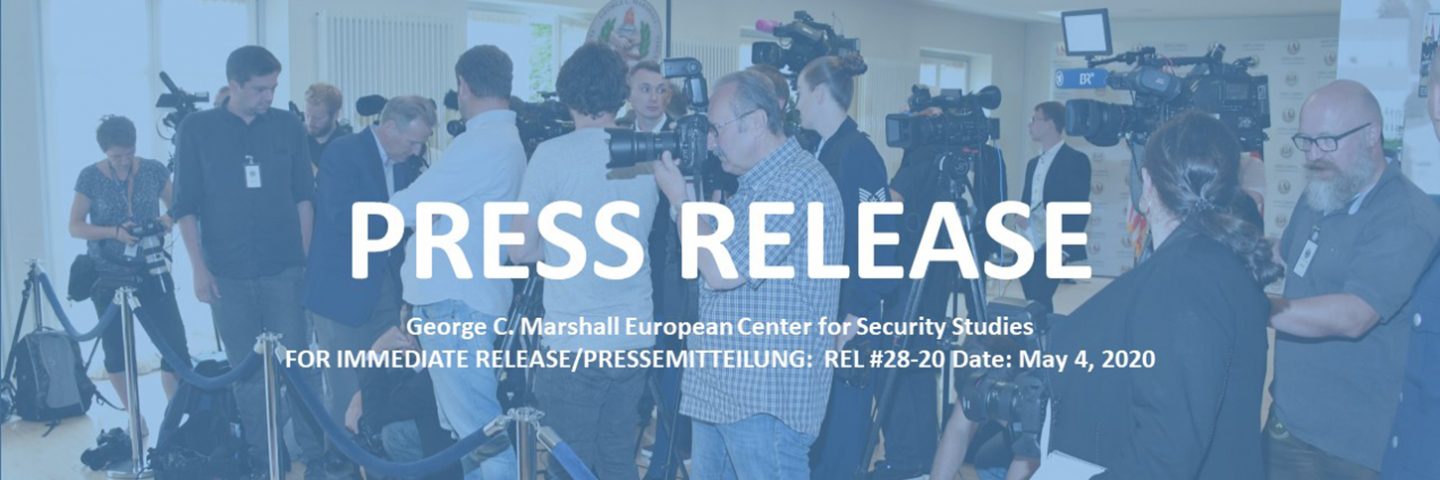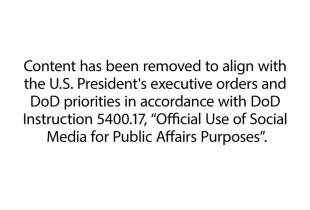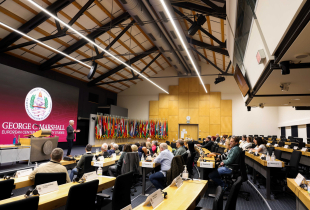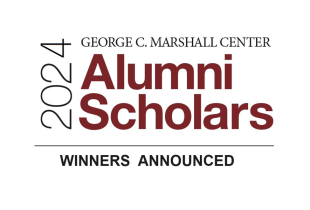
Marshall Center Postpones, Cancels Resident Events due to COVID-19 Travel Restrictions
By Christine June
Public Affairs Office
George C. Marshall European Center for Security Studies
GARMISCH-PARTENKIRCHEN, Germany (May 4, 2020) — The George C. Marshall European Center for Security Studies announced today the decision to postpone and cancel resident events in light of travel restrictions posed by the COVID-19 pandemic.
The Marshall Center is a 26-year-old, German-American defense studies institute based here.
The Senior Executive Seminar, scheduled for June 22 to 26 has been tentatively rescheduled for Aug. 31 to Sept. 4.
“We are continuing to carefully evaluate the situation and adjust our schedule accordingly,” said the Marshall Center Director retired U.S. Army Lt. Gen. Keith W. Dayton. “We are mindful of how the global situation makes it necessary for us to be flexible in our planning.”
The SES is an intensive five-day program tailored to meet the specific needs of national ministers, ambassadors, legislators, general officers and senior government officials who must address the critical issues facing our global and regional security environment.
The Program on Terrorism and Security Studies, scheduled for Aug. 6 to Sept. 3, has been canceled, as well as the accompanying PTSS English Language Enhancement Course, July 1 to Aug. 5.
The Marshall Center’s PTSS develops intellectual interoperability and common understanding regarding the transnational nature of terrorism, improves partner capacity to develop and execute international combatting terrorism strategies and builds and sustain a network of security professional to combat terrorism.
The program on Countering Transnational Organized Crime, originally scheduled for July 8 to 30, is now under review to determine if it can be satisfactorily conducted during Aug. 5 to 27. The accompanying CTOC ELEC has been canceled.
The Marshall Center’s program on Countering Transnational Organized Crime (CTOC) focuses on the national security threats posed by a wide range of transnational criminal activities.
The PTSS and CTOC English Language Enhancement Courses are specially tailored five-week, courses designed by the Marshall Center’s Partner Language Training Center Europe.
These courses combine language skills development with the authentic counterterrorism or counter transnational organized crime content for participants prior to attending these programs.
The Marshall Center’s Partner Language Training Center Europe also announced today the cancellation of the NATO approved Language Testing Seminar, scheduled for June 1 to 12, and three Language Enhancement Courses, scheduled in May to August, will be conducted online.
The LTS is a two-week program with graduate level content for language professionals who work or will work on their nation’s STANAG 6001 testing team. The LEC is the foreign language courses for U.S. military and U.S. Department of Defense civilians.
The Partner Language Training Center Europe, a NATO Partner Training and Education Center, offers advanced and specialized classroom instruction in Arabic, English, French, Persian-Farsi, and Russian to more than 400 U.S. military, and NATO and partner attendees each year.
As announced April 17, the Marshall Center has started to offer events virtually amid the COVID-19 travel restrictions.
“Looking into how we can offer our resident and non-resident events virtually is a work in progress,” Dayton said. “It is not a substitute for our participant-based way of doing business, but we are looking at ways to offer our programs online in the weeks and months ahead and keep engaged with our Alumni.”
The Marshall Center’s CTOC team and Alumni Programs have held already three virtual events (VE). The CTOC team has another VEs scheduled for May and June. The PTSS Team conducted a podcast on the COVID-19 pandemic impact on terrorism and counterterrorism. In addition, there was a VE on the COVID-19 Implication on Great Power Competition and reflections on this seminar will follow in May.
Other virtual events planned for the next two weeks are the Transatlantic Security Jam – NATO-EU Cooperation May 12 to 14, and Five Regional Centers’ Virtual Symposium on COVID-19 Implications in their respective regions in May.
A series of additional virtual events are in the pipeline. The Central European Security Dialogue: “The Landscape of the Transatlantic Alliance in the Post-Pandemic World” for May 6 and 7, Virtual Trilateral Conference to include U.S, Polish and German participants together with The Heritage Foundation, Atlantic Council, German Federal Academy of Security Policy and Polish Institute of International Affairs.
In addition, the GCMC will conduct until end of May a series on virtual events including online seminars on the impact of COVID-19 in Europe and its wider neighborhood on Good Governance and the Domestic Use of State Powers to fight the Pandemic. The Marshall Center is also looking forward to continuing with partners on the tailored seminars for parliamentarians based on online engagement and interactive seminars.
The German Cybersecurity and Data Protection Workshop has been redesigned and transformed to an online forum. The transatlantic workshop will take place throughout June enabling national representatives to participate in five short-duration focus sessions.
Dayton said the Marshall Center leadership are looking at reviewing the possibility of hybrid offerings for the Fiscal Year 21 program.
“There are many creative ideas out there,” he said.
The Marshall Center is one of five U.S. Department of Defense Regional Centers and the only bilateral Center. It is also the only regional center for the Federal Republic of Germany.
The mission of the Marshall Center is to enable solutions to regional and transnational security challenges through capacity building, access, and a globally connected network.
Operating since 1993 as a German-American partnership, the Marshall Center offers post-graduate courses, conferences, research programs, foreign area studies, and language courses to civilian and military professionals from around the world.
To date, the Marshall Center has an alumni network of more than 14,000 security professionals from 157 countries.


